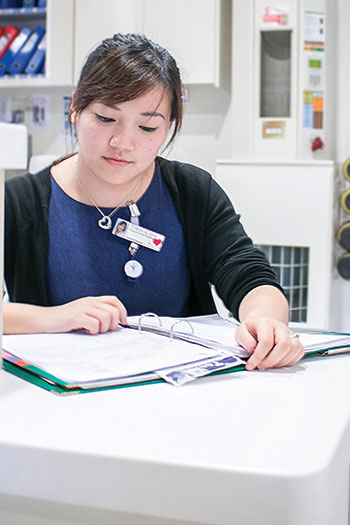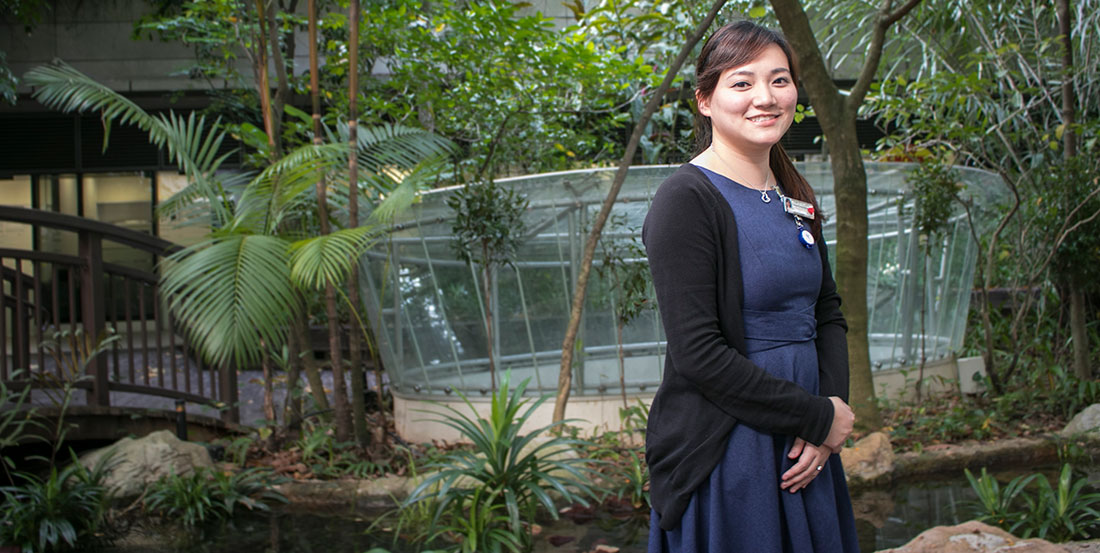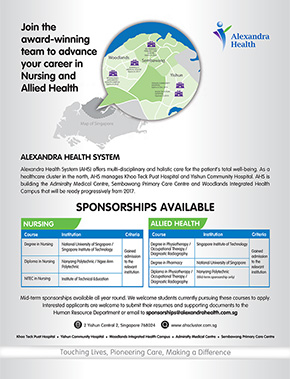Singapore’s public healthcare industry is growing. However, its projected growth means that the industry will face great challenges. It is, therefore, crucial for young talents to step forward and join the public healthcare industry. There are a diverse range of fulfilling and meaningful career options for students to consider pursing within the allied health and nursing fields besides medicine.
Medical social work is one such option within the allied health field. It can trigger change and make a difference in a person’s life. We speak to Dorea Quek, a medical social worker with Khoo Teck Puat Hospital (KTPH). She tells us how the hospital has offered her a supportive and enriching career path, which allowed her to establish herself in the industry, and effect social change.
What sparked your interest in social work?
Dorea Quek: My first lecture on social work in university drew me to the discipline, and was instrumental in my decision to pursue medical social work as a career. During the lecture, we were shown a video of a child being abused. While I felt uncomfortable watching it, I remember thinking, “I can do something to prevent abuse cases like this from taking place”.
I also found myself liking what I heard about the course structure and importance of social work in our society. I was nodding in agreement during the lecture. By the time it ended, I was determined to ace the module, and pursue it formally as a career.
What are the lesser-known facts about the role of a medical social worker?
Dorea: Healthcare professionals are often able to understand a patient based on his or her psychosocial interaction. However, medical social workers focus predominantly on that aspect.
We conduct psychosocial interventions and understand the patient - who he is beyond his medical condition. Many people have the perception that social work is about listening to people, and being emphatic, butut it is more than that. It is a type of social science where one needs to know how bio-psychosocial societal systems work.
What are your roles and responsibilities?
Dorea: My primary role is to help families address a multitude of issues ranging from medical care to financial concerns and marital issues. Although a large part of my role requires us to provide the patient and their family with as much support as possible, we also strive to empower them to be independent. For example, we will advise patients in financial difficulty due to frequent hospitalisation to make better spending and investment choices or budgeting skills. This reduces their reliance on financial assistance.
My team and I also conduct home visits. Sometimes, we will accompany patients home together with an occupational therapist. By observing them in their natural environment, we are able to ensure that they can cope after their discharge from the hospital.
I also participate in multi-disciplinary meetings with doctors, nurses, therapists and volunteers to better understand a patient’s situation in order to provide seamless care.
What are some of the challenges you face?
Dorea: In a medical and inpatient setting, the work is very fast-paced. Patients stay for an average of three to seven days, and the first challenge we face is to be acquainted with them within a short period of time.
The other challenge I grapple with quite often is the emotional attachment to patients and their caregivers. As a social worker, I will enter a patient’s and caretakers’ lives, and my interventions do become a part of their story. Sometimes, these interventions are not successful.
I have since learnt to self-care and have a work-life balance to meet the demands of my role. I am also fortune to have good colleagues who provide me with a strong support network. My supervisors who provide me with constructive feedback are have also helped me improve my approach towards patients and their caregivers.

Dorea Quek
Medical Social Worker
Khoo Teck Puat Hospital
How has KTPH supported your professional development?
Dorea: KTPH believes very strongly in investing in their staff and skills upgrading. As such, they have sent me to attend both internal and external courses to expand my skillsets beyond medical social work in areas such as health advocacy and service quality. These courses help me to be more effective in my role. Apart from attending courses, I also had the opportunity to share with my colleagues and become someone who can influence others.
What qualities should a medical social worker possess?
Dorea: While compassion is necessary, it is not enough on its own to excel as a medical social worker.
A good medical social worker should be compassionate, judicious and be able to cope with the different types of emotions they may experience during their work. These qualities are important in managing work efficiently, especially during stressful periods.
What advice would you give students who are planning to pursue medical social work?
Dorea: The role can be very stressful at times, and I was nearly burnt out once. However, it is one of the most meaningful careers. You will be inspired, and inspire those you are helping. There is never a dull day at work. If you are up for an exciting and stimulating career, and love a fast-paced environment, I would advise you to go for it!
If you were to describe medical social work as a profession in one phrase, what would you say?
Dorea: Life-changing, for you and for others.

